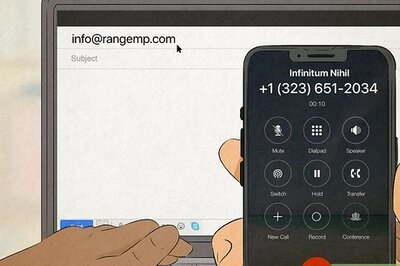
views
“Please Bear With Me” Meaning
“Please bear with me” is a polite expression to ask for someone’s patience. “Bear with me” or “Please bear with me” are slightly more formal ways to say phrases like “Give me a moment” or “Please wait a minute.” Including “Please” makes the expression more polite or formal, but a simple “Bear with me” is also considered very polite and gracious. Here are some correct examples of the phrase: “I’m experiencing some internet issues today. Please bear with me.” “I’m running a few minutes late due to traffic, so please bear with me.”
Is it “Please bear with me” or “Please bare with me”?
The correct expression is “Please bear with me.” “Please bear with me” (or simply “Bear with me”) is a common English expression that means “Please be patient with me.” One meaning of the verb “to bear” is “to accept or endure,” so when you’re asking someone to bear with you, you’re really saying something like “Please accept or endure this pause or interruption.” “To bear” can also mean “to carry” (as in, “the right to bear arms”) or “to produce or yield” (as in, “the tree bears fruit” or “loans that bear interest”). How to Remember the Difference If you’re stuck on “bear” vs. “bare,” remember that a bear (the animal) has big paws. When you ask someone to bear with you, you’re asking them to “pause” too.
“Bare with me” has a different meaning that doesn’t make much sense. “To bare” something means “to uncover, reveal, or expose” it. So, if you were to ask someone to “bare with you,” you’d be asking them to “reveal or expose” something with you or for you (or maybe even to “reveal or expose” you—the meaning gets a little confusing since “bare” isn’t used this way). For example, a dog might “bare its teeth” when it feels threatened, or you might “bare your soul” to someone when you tell them your deepest secrets. Unlike “to bear,” which has multiple possible meanings, “to bare” only has one meaning. “Bear” and “bare” are homophones, or words that sound identical but are spelled differently and mean different things.
When & How to Use “Please Bare With Me”
Use “Please bear with me” at work or in formal situations. Since it’s a polite and professional-sounding expression, feel free to use “Please bear with me” or “Bear with me” with colleagues, employees, bosses, and other professional contacts. It’s also great for other formal situations, like presentations, ceremonies, and special events. For example, if you were presenting a slideshow at a conference and the projector glitched, you could say “I’ll need a moment to fix the projector. Please bear with me.” Or, imagine you’re extra busy at work and can’t attend to everyone’s questions right away. You might say, “I will answer all questions once I’ve processed all of these applications. Bear with me, please.”
Say “Please bear with me while…” to explain what’s causing the holdup. Often, people will explain what they’ll be doing during the pause or delay to remedy the situation. For example, if you’re having trouble with your camera during a video call, you could say, “Please bear with me while I troubleshoot my webcam.” That way, listeners will understand that you’re working on resolving the camera issue and to be patient while you do so. Here are some examples: “Please bear with me while I get caught up on the important items I missed while I was out of the office.” “My knee is killing me today. Bear with me while I walk up the stairs.”
Using “Bear With Me” in Past Tenses
The simple past tense of “bear” is “bore.” To talk about someone bearing with you in the past, use the phrase “You/he/she/they/it bore with me.” For example: “She bore with me while I tried to fix the carburetor on the side of the road.” “Thankfully they bore with me while I was running late to the office.” Contrast: The past tense of “bare” is “bared” (for example, “He bared all in a revealing new photoshoot.”).
The past perfect tense (pluperfect) of “to bear” is “had borne.” This tense refers to something that happened in the past before something else that also happened in the past. So, use “you/he/she/they/it had borne with me” when telling a story with multiple events in the past. For example: “He had borne with me until our manager arrived.” “They had borne with us all morning but got impatient once lunch had passed.” Contrast: The past perfect tense of “to bare” is “had bared” (for example, “The wolf had bared its teeth at us before we even saw it.”).
The past participle of “to bear” is both “was borne” and “was born.” A past participle is a word formed from a verb to show an action was completed in the past and in the passive tense. “To bear” is interesting because it has two different past participles depending on which meaning of the verb you’re using. For example: Use “was borne” to refer to carrying or enduring something. For example, “Her burden was borne in secret.” Use “was born” to refer to the birth of something or someone. For example, “My son was born on June 19” or “The idea was born during my travels to Brazil.” Contrast: The past participle of “to bare” is “was bared” (for example, “The truth was bared for all to see.”).
“Please Bear With Me” Synonyms
Formal alternatives Use these similar phrases that also mean “Please have patience” or “Please be patient with me” at work or in other formal situations: “Please hold on for a moment.” “Please be patient.” “Just a moment, please.” “Thank you for your patience.” “I appreciate your patience.” “Please stand by.” “Please wait.”
Informal alternatives Use these more casual synonyms with family, friends, or in informal situations like social gatherings: “Hang on” or “Hang tight.” “Just a minute.” “Stick with me.” “Give me a moment/minute/second.” “I’ll need you to put up with me for a minute.” “Cut me some slack.”
Where did “bear with me” come from?
The phrase probably has roots in the Old English word beran. Old English was spoken from about 450 to 1100 CE. The word beran is a verb meaning “to carry or bring forth,” “to give birth to,” or “to endure without resistance” (similar to “bear” today) and comes from the Proto-Indo-European root word “bher-” (“to carry a burden” or “to give birth”). It’s hard to know exactly when the full phrase “Bear with me” came to be, but it may have been during the 1520s when “bear” came to mean “to uphold” or “to sustain without sinking” more commonly. One of the earliest written records of “Bear with me” is in Shakespeare’s play Julius Caesar. In it, the character Antony says, “Bear with me; My heart is in the coffin there with Caesar.” This doesn’t mean Shakespeare invented the phrase, butit shows that it was already in use during his lifetime (1564 to 1616). Other “bear” phrases that come from Old English include “to bear down” (to proceed forcefully forward), “to bear something in mind” (to remember something), and “to bear up” (to be firm or have fortitude).



















Comments
0 comment